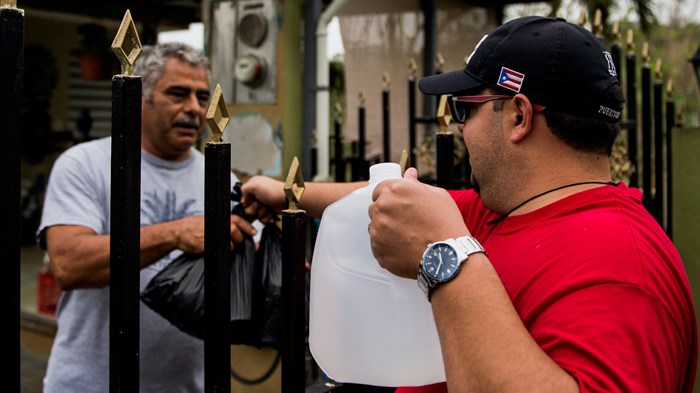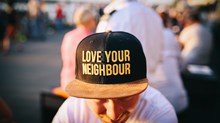How Not to Bring Relief After Hurricane Ida

Hurricane Ida made landfall in Louisiana as a category 4 hurricane on the 16th anniversary of Hurricane Katrina. This historic storm has left a path of destruction in New Orleans and the Southeast region that includes loss of life, injuries, flooding, and wind damage. As you’ve been watching the news unfold you may be wondering how you and your church might help. As we regularly talk about on our Better Samaritan podcast, unfortunately not all good Samaritan efforts actually help. In fact, we’ve seen first hand how sometimes well intentioned Christians and churches end up causing more harm than helping. Following are seven ways how not to help after Hurricane Idea so that you and your church can be confident in the aid you provide.
Don’t view prayer as a last resort
When people of faith promise to “send our prayers” to those who’ve endured hardship, it’s more than a soothing sound bite. Because we’re convinced that prayer is given by God to call out for divine help, and that God hears the prayers of God’s people, it’s more than a meaningless gesture. Especially the prayers we offer for those in need. In times of disasters, it’s important for us to remember that prayer is not an afterthought. Rather, it’s one of the most powerful things we can do to help. With the confidence that God hears every word from your lips, carve out time today to pray for those suffering from Hurricane Ida.
Don’t ignore COVID-19 safety practices
In the months and weeks leading up to Hurricane Ida, the Southeast region—including some of the places hardest hit—had seen drastic spikes in COVID-19 rates. Not only had rates increased, but so had hospitalizations and deaths caused by the pandemic. With Delta continuing to spread, it’s as important now as it was at the beginning of the pandemic to take COVID-19 safety precautions seriously.
Don’t set out to be a hero
While the impulse to help is a good one, some can be tempted to get involved for the wrong reasons. When we respond because we want to be heroes, our actions are more likely to harm than to help. Those who have a hero complex are helping for the purpose of meeting their own needs, and not the needs of others. Some who are driven by the adrenaline rush want to “get in on the action.” Others, who might have good intentions, want to be known as do-gooders. And others, who are themselves distraught by the disaster, may engage as a way to soothe their own negative feelings. If any of these sound like you, pause before engaging. The antidote to harmful heroism is humility. The humble helper is other-oriented and pays attention to notice what survivors most need.
Don’t be a spontaneous unaffiliated volunteer
In our work among survivors, some of the most harmful responses we’ve seen have been from SUV’s: spontaneous unaffiliated volunteers. These helpers show up, uninvited by any organized reputable organization, and actually contribute to the chaos. In the wake of Hurricane Katrina, one local leader taught our team, “Volunteers were one of the biggest blessings after Katrina, and volunteers were one of the biggest curses after Katrina.” This is because unaffiliated volunteers can thwart the work of trained responders, divert resources from survivors, and further tax strained local infrastructure. To be truly helpful, submit yourself to the leadership of established relief groups, ministries, and community organizations.
Don’t give unsolicited goods
While it feels good to show up with “stuff” you think people might need, this form of assistance can become more about you—or your church or other helping group—than it is about what survivors most need. Don’t assume that you know what survivors need. A helpful rule of thumb is that “Aid happens where need meets resources.” It’s better to leave room for those who’ve survived to name what will most help them. Then, respond accordingly. If your help is going to make a lasting and effective difference, it needs to match up with what the actual needs on the ground are—both right now and in the future.
Don’t forget to help after the headlines stop
Studies have shown a direct correlation between media coverage and donor giving. What that means is that when news coverage moves on to the next big story, financial giving diminishes. Research has also demonstrated that the early phase of disaster response is when the most robust giving occurs. But the impact of this week’s hurricane means that the time it takes for communities to recover will last long beyond the headlines. Donations will most likely dry up although there’s still more work to be done for survivors to flourish again. Communities impacted by Hurricane Ida not only need your gifts now, but will continue to need your donations throughout the recovery process.
For more disaster ministry best practices, tools and resources visit our resource page at the Humanitarian Disaster Institute at Wheaton College. You can also find lots of helpful tools and resources on providing Spiritual First Aid at our resource hub that includes lots of free tools, downloads, manuals, tipsheets. You can also learn more there about our online Spiritual First Aid certificate course.
Kent Annan is director of Humanitarian and Disaster Leadership at Wheaton College, where he leads an M.A. program as part of the Humanitarian Disaster Institute.
Jamie Aten is the founder and executive director of the Humanitarian Disaster Institute and Blanchard Chair of Humanitarian and Disaster Leadership at Wheaton College. He is the author of “A Walking Disaster: What Surviving Katrina and Cancer Taught Me about Faith and Resilience.”
The Better Samaritan is a part of CT's
Blog Forum. Support the work of CT.
Subscribe and get one year free.
The views of the blogger do not necessarily reflect those of Christianity Today.






















